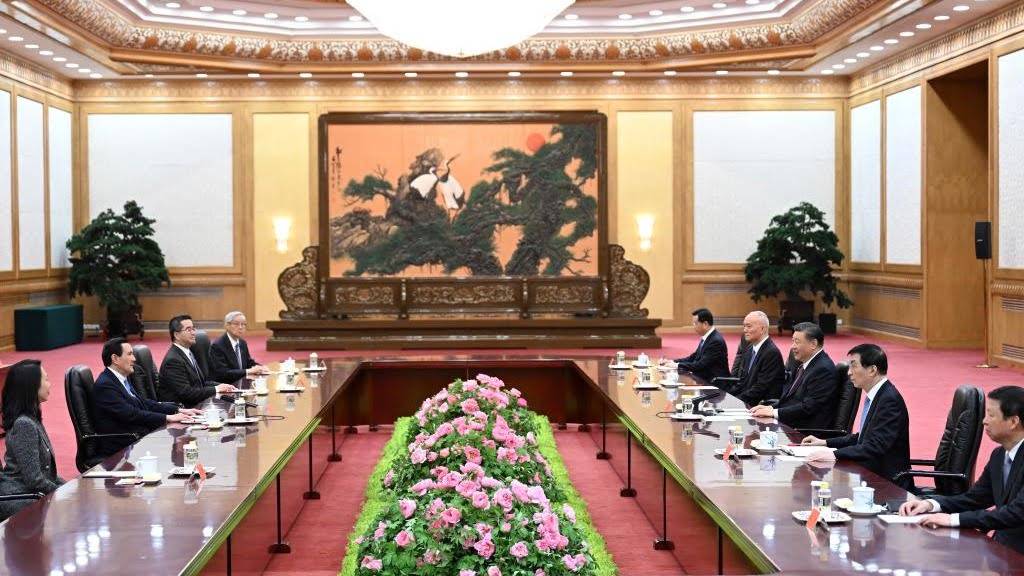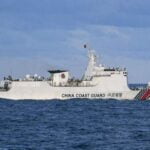From April 1 to 11, Ma Ying-jeou, former chairman of the Chinese Kuomintang party, is leading young people from the Taiwan region to the Chinese mainland for talks. He met with Xi Jinping, general secretary of the Communist Party of China Central Committee, on April 10. This meeting marks the second between Xi and Ma after the two had a historic exchange in Singapore in 2015.
Ma’s trip sent a strong signal of peaceful exchanges and helped maintain peace and stability across the Taiwan Straits. The important speech delivered by Xi at the meeting pointed out the development direction of cross-Straits relations in the future and is of great significance to the peaceful development of cross-Straits relations and peaceful reunification.

The current situation between the Chinese mainland and the Taiwan region is complex. On the one hand, external forces led by the United States continue to intervene in the Taiwan region. The United States, Japan, and the Philippines are holding summits to create an “anti-China encirclement” to further contain China if “something happens in the Taiwan Straits.”
At the same time, the United States continues to strengthen its military security connections with the Taiwan region, including a batch of recently approved arms sales to Taiwan, and the U.S.’s possible participation in the Han Kuang Exercise, the largest annual military exercise in the region in the future, among others.
On the other hand, “Taiwan independence” separatist activities are rampant on the island. The current Tsai Ing-wen administration has dealt harshly with the vicious ship collision incident on February 14, and maliciously spread rumors to slander Ma Ying-jeou’s exchange visit to the mainland.
The Chinese mainland maintains its confidence and determination toward reunification. It has always believed that one of the key factors to resolve the Taiwan question and achieving the reunification of the motherland ultimately depends on the development and progress of the mainland. The mainland’s comprehensive strength advantage over Taiwan is growing day by day, the resources and capabilities that can be mobilized to achieve the reunification of the motherland have increased significantly, and its influence and attraction to the people in Taiwan are also increasing.
Meanwhile, peaceful reunification and “One Country, Two Systems” are the first choices to solve the Taiwan question and are in the best interest of compatriots on both sides of the Taiwan Straits.
Therefore, Ma’s mainland exchanges show the fact that compatriots from both sides of the Taiwan Straits belong to the same Chinese nation, which is of great significance to maintaining the current status of peace and stability. During Ma Ying-jeou’s stay in the mainland, he led a delegation of young people from Taiwan to visit the Great Wall, the Memorial Hall of the War of Chinese People’s Resistance Against Japanese Aggression, and some well-known enterprises. This is valuable in extending the island’s people’s perception of the Chinese mainland.
In terms of the meeting between Xi and Ma, the Chinese president pointed out the direction of the development of cross-Straits relations. Xi stressed “grasping the cross-Straits situation from the perspective of the overall interests and long-term development of the Chinese nation.”
Xi highlighted the significance of firmly safeguarding the shared home of the Chinese nation, and the necessity of collaborating for its long-term well-being, cultivating a strong national cohesion, and striving for the grand rejuvenation of the Chinese nation.
Additionally, Xi particularly emphasized the important role that youth play in cross-Straits relations. His remarks not only are a dedication to both Ma and the members of the delegation of young people from Taiwan, hoping for compatriots on both sides to work together to achieve national reunification, but also signifies the direction of development for future cross-Straits relations.



